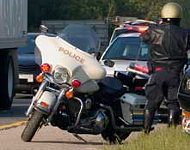Article from: www.thenewspaper.com/news/27/2783.asp
5/21/2009
Group Identifies States Least and Most Friendly to Motorists
Association lists states most likely and least likely to use motorists as a source of revenue.
 The National Motorists Association (NMA) yesterday rated all fifty states based on their friendliness toward the motoring public. By analyzing laws and speed trap patterns, the group measured each state's dependence on the motoring public as a source of state and local revenue.
The National Motorists Association (NMA) yesterday rated all fifty states based on their friendliness toward the motoring public. By analyzing laws and speed trap patterns, the group measured each state's dependence on the motoring public as a source of state and local revenue.
"It is not exactly a well kept secret that many traffic laws, enforcement practices and traffic courts are more about generating revenue and political posturing than they are about traffic safety," NMA President Jim Baxter said in a statement. "During holidays, like the upcoming Memorial Day weekend, we're bombarded with messages about intensified enforcement, 'click it or ticket,' and horrendous fines when in fact most vacation-related traffic accidents are caused my inattention, distraction and fatigue. However, these are accident causes that don't generate much in the way of government revenue, so instead our highways are overrun with unmarked police cars and ticket cameras."
The following were the top-ten worst states from the motorist's perspective:- New Jersey
- Ohio
- Maryland
- Louisiana
- New York
- Illinois
- Delaware
- Virginia
- Washington
- Massachusetts
New Jersey was singled out for being the first to create a "driver responsibility" speeding ticket tax that generated more than $1 billion in profit since 1994. In 2007, a New Jersey judge imprisoned a motorist for a full month over traffic infractions the man did not commit. A New Jersey appellate court convicted a man who was asleep in a legally parked truck of "driving" under the influence of alcohol (DUI). State lawmakers even considered legislation that would have made it a crime to give the finger to another motorist.
"With its toll roads, roadblocks, and speed traps, New Jersey has left almost no stone unturned when it comes to extracting cash from motorists," NMA explained. "The state has also recently pushed through a red-light camera pilot project at a time when many states are banning the ticket cameras because they've proven to have a negative effect on traffic safety."
The group's calculation also weighed the number of of speed traps listed on the Speed Trap Exchange website on a per capita basis. Judicial fairness was factored in by considering the availability of jury trials and trials by declaration for traffic offenses or whether mayor's courts were allowed. The list then considered whether each state had enacted punitive "feel-good" statutes such as primary seatbelt laws, helmet laws, move-over laws and cell-phone bans.
"The long-term solution to aligning legitimate public interests with government policies is to remove the money from traffic regulation, enforcement and adjudication," Baxter said. "Until that happens, the focus on revenue generation will continue to trump effective traffic regulation and ethical enforcement practices."
The five states where motorists will find the most fair treatment are Wyoming, Idaho, Montana, Nebraska and Kentucky. View the full list on the NMA website.
 The National Motorists Association (NMA) yesterday rated all fifty states based on their friendliness toward the motoring public. By analyzing laws and speed trap patterns, the group measured each state's dependence on the motoring public as a source of state and local revenue.
The National Motorists Association (NMA) yesterday rated all fifty states based on their friendliness toward the motoring public. By analyzing laws and speed trap patterns, the group measured each state's dependence on the motoring public as a source of state and local revenue.